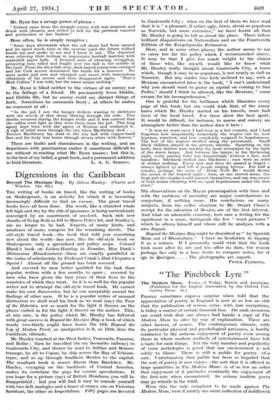Digressions in the Caribbean
THE writing of books on travel, like the writing of books on Shakespeare, is an activity for which it is becoming increasingly difficult to find an excuse. The great travel books have all been done. The world, like •a stranded whale left high and dry by the ebb of ignorance, is being meticulously scavenged by an assortment of sea-fowl. Such rich new chunks of living flesh as fell to Marco Polo's lot, and Stanley's,• are no longer to be had. Experts of many kinds, and amateurs of more, compete for the remaining shreds. The old-style travel book—the book that told you something new about the world—has now, like the old-style book on Shakespeare; only a specialized and paltry scope. Colonel Blank's book on Lichen-Hunting in Ecuador, Miss Dank's Melanesian Misadventures—these are exactly paralleled in the realm of scholarship by Professor Crank's Had Cleopatra a Squint ? Almost all the ground has been covered.
And covered by men better qualified for the task than popular writers with a few months to spare ; covered by men who have given the best years of their lives to the countries of which they treat. So it is as well for the popular writer not to attempt the old-style travel book. He cannot make his own discoveries, but he can acceptably emend the findings of other men. If he is a popular writer of unusual distinction we shall read his book as we read (say) the Tour of the Hebrides, not so much for the light it throws on the places visited as for the light it throws on the author. This, at any rate, is the policy which Mr. Huxley has followed with great success in Beyond the Mexique Bay, a book of which nearly two-thirds- might have borne the title Beyond the, Leg of Mutton Pond, so unobjective is it, so little does the Caribbean obtrude.
• Mr. Huxley touched at the West Indies, Venezuela, Panama,' and Belize ; then he travelled (by my favourite railway) to. Guatemala City, and thence by road to Atitlan and Momos- tenango, by air to Copan, by ship across the Bay of Tehuan- tepec, and so up through Southern Mexico to the capital. The resultant book is nearer Bacon than Baedeker. Mr. Huxley, voyaging on the backbone of Central America,. Makes its vertebrae the pegs for cosmic speculations. If you hope for a picture (say) of British Honduras you will be disappointed-; but you• will find it easy to Console yourself with two deft analogies and a brace of essays, one on Victorian furniture, the other on Imperialism. Fifty pages are devoted
to Guatemala City ; when on the first of them we have read that it is " a pleasant, if rather ugly, town, about as populous as Norwich, but more extensive," we have learnt all that Mr. Huxley is going to tell us about the place. There follow brilliant disquisitions on Nationalism and on the Fourteenth Edition of the Encyclopaedia Britannica.
. Here, and in some other places, the author seems to me to carry too far the policy which I recommended above.
It may be that I give too much weight to the claims of those who, like myself, would like to know what Mr. Huxley really thought about Guatemala City, a town which, though it may be as populous, is not nearly as dull as Norwich. But any reader who feels inclined to say, with a Mexican encountered later in the book, " I can't understand why you should want to gastar su capital on coming to San Pedro," should I think be allowed, like the Mexican, " some excuse for his incomprehension."
One is grateful for the brilliance which illumines every page of this book, but one could wish that, of the many hares which Mr. Huxley started on his travels, more had been of the local breed. For these show the best sport. It would be difficult, for instance, to assess and convey an atmosphere. better than the author does it here :
" It was six years since I had been in a hot country, and I had forgotten how unspeakably melancholy the tropics can be, how hopeless, somehow, and how completely resigned to hopelessness. The feet of the negroes shuffled along the pavements. Small black children played in the gutters, silently. Squatting on the kerb, their fathers were reading the local newspaper by the light of the street lamps. And between the lamps, in the thickening night, every passing form was disquietingly without a face, and handless ; blackness melted into blackness ; men were as suits of clothes walking. Every now and then we passed a chapel— always lighted up and full of people singing hymns. For half a minute, perhaps, the noise of ' Abide With Me ' would drown the noises of the tropical night ; then, as one moved away, the frogs and the cicadas would reassert themselves, and one was aware of both noises vibrating with an equal hopelessness under the first stars."
His observations on the Mayan preoccupation with time and with the emblems of mortality are major contributions to conjecture; if nothing more. His conclusions on many subjects, from the coffee situation to Mr. Stuart Chase's receipt for the salvation of Mexico, are of the- first interest. And what an admirable economy, how sure a feeling for the significant in a scene, distinguish the few " word pictures " which he allows himself and whose cult he analyses with a
nice disgust.
Beyond the Mexique Bay might be described as " by Spanish Main out of Bloomsbury." I have no hesitation in tipping it as a winner. If I personally could wish that the book took more after its sire and less after its dam, the reason perhaps -lies only in a base desire to compare notes, for et ego in Quirigua. . . . The photographs are superb.
PETER FLEMING.












































 Previous page
Previous page